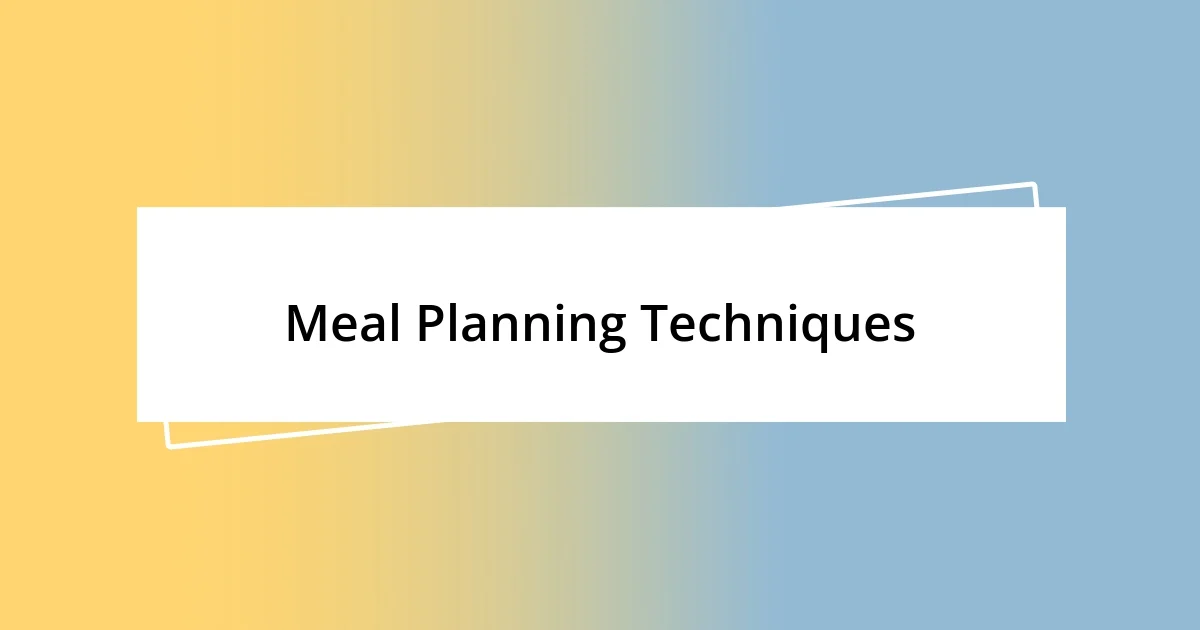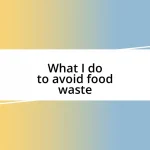Key takeaways:
- Healthy cooking classes boost confidence, fostering a supportive community and enhancing culinary skills.
- Understanding nutritional principles, including macronutrients and food pairing, empowers better meal choices.
- Meal planning techniques, such as batch cooking and utilizing seasonal ingredients, streamline the cooking process and promote healthier eating.

Benefits of Healthy Cooking Classes
One of the most significant benefits of healthy cooking classes is the confidence they instill in participants. I remember the first time I chopped vegetables with precision instead of the usual haphazard way I had done in my kitchen. That simple experience made me realize how capable I was of creating delicious, nutritious meals. Do you ever feel intimidated by cooking techniques? Trust me, with the right guidance, you can easily turn that intimidation into excitement.
These classes also foster a sense of community. Sharing meals and experiences with others creates bonds that go beyond just food. I recall a cooking class where we all prepared a dish together, and the laughter and camaraderie made the healthy meal taste even better. Have you ever experienced the joy of cooking with friends? The warmth from these interactions can motivate us to maintain healthier lifestyles.
Additionally, healthy cooking classes serve as a valuable source of knowledge about nutrition. Learning to read labels and understand ingredient choices can be eye-opening. I still remember the moment I learned how to substitute unhealthy fats with avocado or applesauce in my baking. It felt like unlocking a treasure chest of cooking secrets! Aren’t you curious about how everyday ingredients can impact your health? Those revelations can transform your perspective on cooking and eating for the better.

Skills Gained in Cooking Classes
Taking healthy cooking classes has significantly improved my practical kitchen skills. For instance, I never thought I could master the art of sautéing until I learned the proper technique. The intense focus on timing and temperature not only enhanced the flavor of my dishes but also saved me from those dreaded burned meals. Do you feel like cooking sometimes is just a guessing game? Trust me, after a few classes, you’ll learn to trust your instincts.
Knife skills are another crucial takeaway. I used to dread chopping onions, and not just because of the tears! But after some practice, I found that my chopping became not only efficient but also enjoyable. I can still recall the satisfaction I felt when I finished dicing a whole onion in under a minute. You might be surprised how such a simple skill can elevate your confidence in the kitchen.
Furthermore, these classes taught me the importance of meal planning and preparation. I used to scramble to whip something together at the last minute, leading to unhealthy choices. By learning to plan ahead, I now enjoy stress-free weeks with pre-prepped ingredients. It’s a game-changer that I never expected! Have you considered how much time you could save by organizing your meals in advance?
| Skill | Description |
|---|---|
| Technical Skills | Improvement in cooking techniques such as sautéing and roasting, leading to better dishes. |
| Knife Skills | Enhanced chopping and slicing techniques, reducing prep time and increasing efficiency. |
| Meal Planning | Ability to prepare meals in advance, promoting healthier eating and less stress. |

Understanding Nutritional Principles
Understanding nutritional principles is essential for anyone looking to enhance their cooking skills and overall health. During one class, I vividly remember reading food labels for the first time. It felt like putting on a pair of glasses that helped me see the hidden sugars and fats I usually overlooked. I realized how much control I had over my ingredients, which empowered me to make healthier decisions with every recipe.
When it comes to the building blocks of nutrition, here are some key principles that resonate with me:
- Macronutrients: Understanding carbohydrates, proteins, and fats is crucial. For instance, I learned that whole grains provide sustained energy, while healthy fats, like olive oil, are essential for nutrient absorption.
- Vitamins and Minerals: Recognizing the importance of fruits and vegetables in providing vital vitamins helped me color my plate more vibrantly. Who knew, adding a splash of color could significantly boost my nutrition?
- Food Pairing: Learning how certain foods complement each other nutritionally taught me to create balanced meals. Pairing vitamin C-rich foods with iron sources, for example, dramatically improved my absorption of this essential mineral.
Connecting these principles to cooking has transformed how I approach meals. Each lesson felt like uncovering a new layer of knowledge that was both fascinating and liberating.

Meal Planning Techniques
When I first started meal planning, it felt like tackling a giant puzzle. The key technique that made it all click for me was breaking down my meals into categories: protein, veggies, grains, and healthy fats. I remember sitting at my kitchen table one Sunday, plotting out my week, and feeling this wave of relief wash over me as I realized I could create balanced meals without the midday scramble. Have you ever had that moment where everything just feels right in the kitchen?
I also embraced the idea of batch cooking. One memorable Saturday morning, I decided to roast a whole tray of vegetables and grill a few chicken breasts. The aroma filled my home, and I couldn’t help but feel a sense of accomplishment. Portioning these ready-to-eat meals for the week made weeknight dinners a breeze. No more decision fatigue! Instead, I got to enjoy meals I genuinely looked forward to. Isn’t it amazing how something so simple can spark joy?
Lastly, incorporating seasonal ingredients has been a revelation. I always thought grocery lists were set in stone until I learned to adapt them based on what’s fresh. One time, I came across a local farmers’ market and left with bags of juicy tomatoes and fragrant basil. I whipped up a delicious pasta, and it reminded me of summer days spent with family in the garden. Planning meals this way not only supports local farmers but also keeps my dishes vibrant and exciting. What’s your favorite way to bring seasonal produce into your meals?

Kitchen Equipment Essentials
Having the right kitchen equipment has truly changed the game for me. When I first joined cooking classes, I noticed how essential tools like a good chef’s knife and a sturdy cutting board made such a difference in my prep work. I vividly remember the first time I sliced through an onion with a well-balanced knife—the precision felt empowering and made the task enjoyable. Have you ever felt that satisfaction when everything clicks into place in the kitchen?
Another must-have is a set of high-quality cookware. I used to think any old pot would do until I tried cooking with stainless steel pans. The even heat distribution transformed my ability to sear meats perfectly, which is something I proudly demonstrated to friends at a dinner party. What a thrill it was to watch their faces as they savored each bite, knowing I had leveled up my cooking skills thanks to the right gear!
Lastly, I can’t emphasize enough the benefits of investing in a reliable food processor. It may seem like a luxury, but after my first experience using one, I can’t imagine my kitchen without it. Chopping, mixing, and pureeing in mere seconds saved me mountains of time on busy days. Just the other night, I whipped up a creamy hummus in under five minutes, and the compliments from my guests were instant. Isn’t it remarkable how the right tools can lead to not just efficiency but also creativity in the kitchen?

Exploring Healthy Ingredients
Exploring healthy ingredients has been a deeply rewarding experience for me. One day in class, I experimented with quinoa for the first time, and it blew my mind how versatile it was. As I combined it with colorful bell peppers and zesty lime, I felt an exhilarating sense of creativity wash over me. Have you ever discovered an ingredient that opened a new culinary world for you?
While learning about different veggies, I encountered kale, which I initially dubbed “the tough green.” However, after trying it in a vibrant salad with lemon vinaigrette and seeds, I appreciated its chewy texture and nutrient profile. I recall the crunch and freshness that invigorated my palate, leaving me eager to explore more leafy greens. It’s fascinating how a simple salad can change your perception of an ingredient, don’t you think?
Another memorable moment came when I was introduced to spices—oh, the spices! The profound impact of adding fresh herbs like cilantro or thyme to a dish is something I cherish. One evening, I scattered fresh herbs over a steaming vegetable stir-fry and took a moment to breathe in the aroma. It made my kitchen feel like a fine restaurant, and I couldn’t help but smile as the flavors danced on my tongue. What’s one spice that elevates your meals like nothing else?

Tips for Continued Cooking Success
One key to continued success in the kitchen is to cultivate a sense of patience and experimentation. I vividly remember one evening when I decided to tweak a classic recipe for roasted vegetables. Instead of just salt and pepper, I added a sprinkle of smoked paprika and a drizzle of balsamic glaze. The result? A symphony of flavors that transformed a simple side dish into a centerpiece. Have you ever had that kind of serendipitous moment while cooking where a small change leads to something extraordinary?
Another tip is to always keep learning. Joining a cooking class bathed me in a world of knowledge, and it’s a journey I’ve carried forward. I make it a point to watch cooking shows or read blogs regularly; just yesterday, I stumbled upon a chef demonstrating how to make homemade almond milk. I jumped right in, and the satisfaction of creating something new from scratch was invigorating. Enthusiasm for learning can reinvigorate your passion for cooking.
Lastly, maintaining a well-organized kitchen can drastically impact your cooking success. I learned this the hard way after making a frantic search for a measuring cup while preparing a special dinner. Since then, I’ve dedicated time to arrange my pantry and utensils, ensuring everything is in its rightful place. Now, the smooth flow of my cooking process not only saves time but also elevates my overall enjoyment in the kitchen. How do you feel when you can navigate your space effortlessly?














